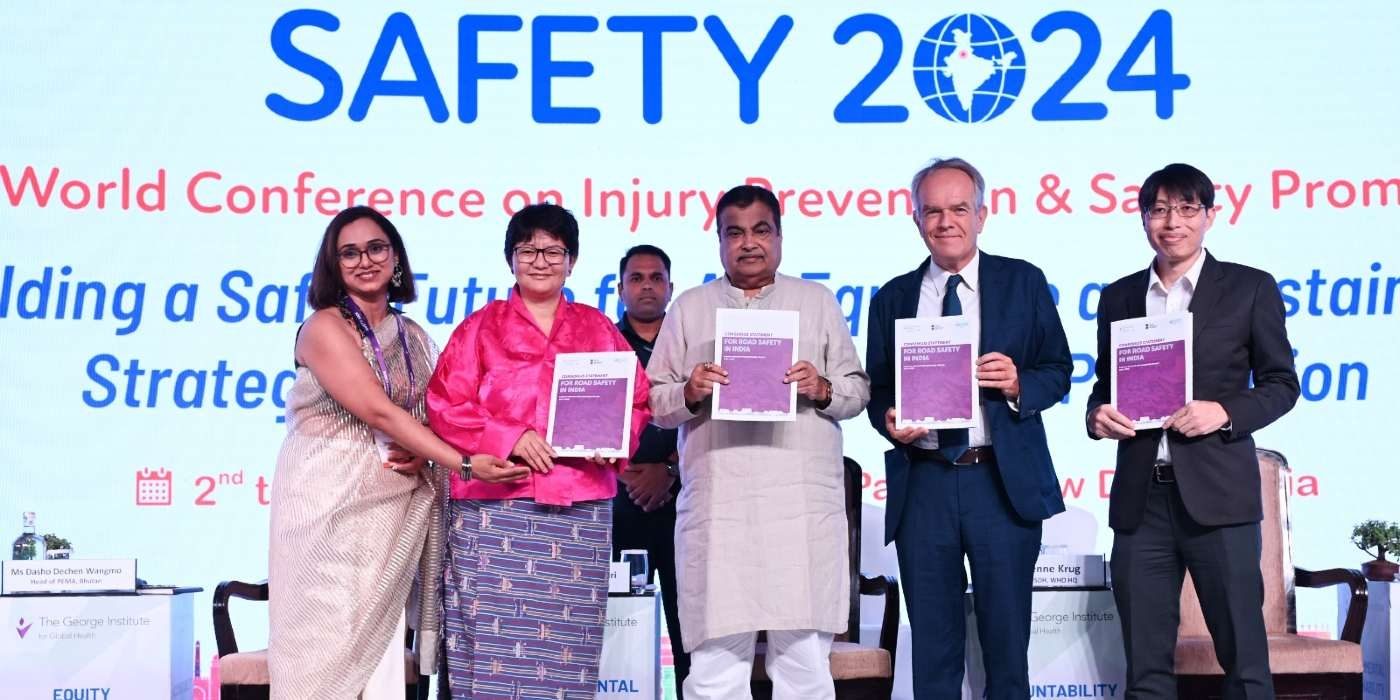
Hon'ble Union Road Transport and Highways Minister Shri Nitin Gadkari Reinforces India’s Commitment to Road Safety at Safety 2024 Conference
Shri Nitin Gadkari released the ‘Consensus Statement for Road Safety in India’ for next five years.
The Union Minister of Road Transport & Highways, Shri Nitin Gadkari, delivered a compelling keynote address at the Safety 2024 conference, hosted by The George Institute for Global Health and co-sponsored by the World Health Organization (WHO) in New Delhi. The Minister underscored the Government's unwavering commitment to enhancing road safety across the nation, aiming to significantly reduce road accidents and fatalities.
As part of the event, the Minister released the ‘Consensus Statement for Road Safety in India (Evidence-informed and Contextually Relevant 2025–2030),’ calling on global and Indian civil society organisations to unite in making road safety a priority, particularly in school education for young people.
In his address, Shri Nitin Gadkari, Hon'ble Minister of Road Transport & Highways, Government of India, said, “Our efforts must extend beyond improving road infrastructure; we must focus on changing human behavior, particularly among vulnerable groups like two-wheeler riders and pedestrians. It is alarming that 45% of accidents involve two-wheelers, and a significant number of deaths could have been prevented with proper helmet usage. We must prioritize education and awareness campaigns, starting from our schools, to instill a culture of road safety from a young age. Moreover, collaboration with industries, such as encouraging two-wheeler manufacturers to provide helmets with their vehicles, can be a crucial step in saving lives.”
Shri Gadkari also emphasised the importance of a collective effort to tackle road safety challenges. "It's time for a collective effort—government, industry, and citizens alike—to address this issue head-on. By implementing strategic measures, creating safer road environments, and fostering a respect for the law, we can significantly reduce the number of accidents and make our roads safer for everyone," he added.
Watch Minister Shri Gadkari’s full speech at Safety 2024:
https://www.youtube.com/watch?v=rQqlPQ3sp9s
India is currently experiencing a significant increase in motorization and an expansion of its road network. As a developing economy, it is crucial for the country to decouple economic growth from traffic safety issues. The Annual Report on Road Accidents in India for 2022 revealed that the country witnessed 4,61,312 road crashes, resulting in 1,68,491 fatalities and injuries to 4,43,366 individuals. This represents an increase of 11.9% in crashes, 9.4% in fatalities, and 15.3% in injuries compared to the previous year. On average, there are 1,264 crashes and 462 deaths daily, translating to 53 crashes and 92 deaths every hour.
The newly released Road Safety Action Plan, aligned with the Decade of Action for Road Safety and the Motor Vehicles Act of 2019, is guided by the best available evidence, contextual implementation readiness, and actionable policy changes. It also aligns with insights from the World Health Organization’s Global Status Report on Road Safety 2023 and the 15th World Conference on Injury Prevention and Safety Promotion.
Delivering his keynote address at the Plenary session on the concluding day of Safety 2024 conference, Dr. Vinod K. Paul, Member, NITI Aayog, said, "The government provides financial protection to Indians through the Ayushman Bharat health insurance scheme, which now covers almost 180 million families. This scheme includes coverage for injuries and drowning, offering cashless insurance and care in India, resulting in better care, improved health outcomes, and reduced catastrophic expenses for Indians."
Dr. Jagnoor Jagnoor, Head, Injury Program, India, said, "We believe that bringing communities at the centre of all research, practice, and policies is essential to saving lives. To achieve this, we must focus on a safe systems approach and implement multiple layers of safety and risk aversion. Together, we can create a safer future for all."
Dr. Etienne Krug, Director, Department of Social Determinants of Health, WHO Geneva, emphasized the importance of high-level representation at the upcoming Ministerial Conference. “The bridge between scientific research and political action is built through close collaboration with policymakers. These conferences are not just about sharing knowledge—they are about ensuring that governments transform evidence into legislation and action. We are far from eliminating violence against children and road fatalities, but with united political will, we can make significant strides toward these goals," he said.
The session on Beyond Band-Aids: Political Determinants for Injury Prevention and Safety Promotion also featured a poignant statement from Sathi Pal, a student from the Sundarbans in West Bengal, who shared her community's concerns about drowning. "Drowning is a silent killer in Sundarbans. With three-quarters of the world covered in water and the frequent cyclones we face each year; our fear has grown. We work to prevent it and raise awareness within our community," she shared.
The 3-day conference on road safety and injury prevention concludes today. With global participation from experts, research organizations and institutes, bilateral and multilateral agencies, hosted by The George Institute for Global Health and the World Health Organization (WHO) had powerful sessions on road safety, injuries prevention, gender-based violence prevention, child violence prevention and many other very relevant topics to make the world a safer place for all.






